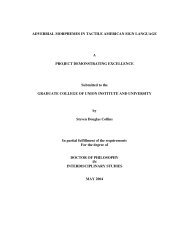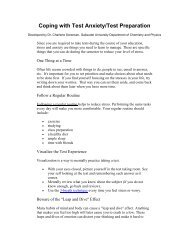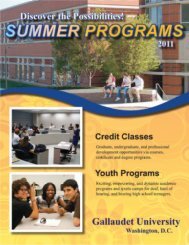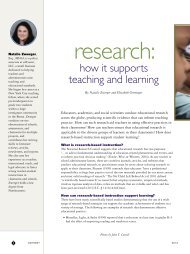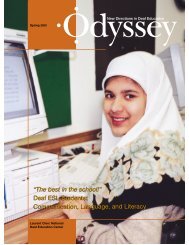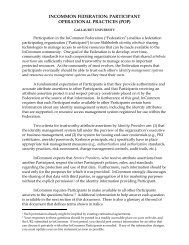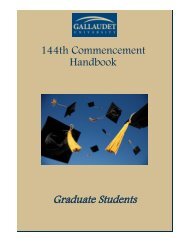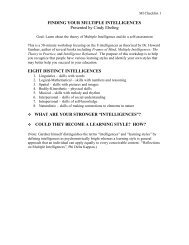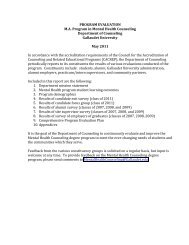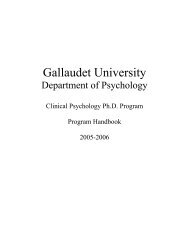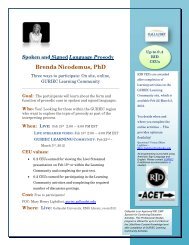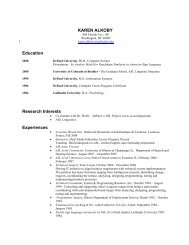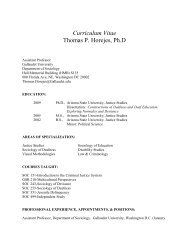practices - Gallaudet University
practices - Gallaudet University
practices - Gallaudet University
You also want an ePaper? Increase the reach of your titles
YUMPU automatically turns print PDFs into web optimized ePapers that Google loves.
Fostering Communication Through Logs<br />
Trina’s mother and father diligently recorded their daughter’s<br />
new experiences in a detailed log. We organized their report<br />
according to their child’s daily routines, such as feeding,<br />
dressing, indoor play, outdoor play, and church. Then we<br />
devoted intervention toward expanding and varying each of<br />
these routines.<br />
The parental log became the focus of intervention. We<br />
devoted part of each intervention session to reviewing new<br />
developments and placing these new developments into the<br />
context of previous accomplishments. In a short time, Trina’s<br />
parents’ entries became quite long and detailed.<br />
Two important outcomes resulted. First, Trina became<br />
increasingly happy and assertive as she discovered she could do<br />
new things in the world. Her nonproductive behaviors,<br />
indicative of social-emotional disconnection, waned. Second,<br />
her parents’ attitudes changed as they became increasingly<br />
proud of what she was learning. They had raised the ante<br />
(Bruner, 1981) by expanding her experiential and social worlds.<br />
By the end of the year, Trina had made several major changes.<br />
She was beginning to name things. She also showed pleasure,<br />
especially when she did something new. Her social and<br />
experiential worlds had expanded greatly, and<br />
her asocial, self-harming behaviors<br />
had virtually disappeared.<br />
Her parents<br />
appreciated<br />
32<br />
her development, and they could turn to the log as proof<br />
positive that their child had made major progress.<br />
Not a New Idea<br />
Parental logs to document a deaf or hard of hearing individual’s<br />
progress have been used for many years (Bailes et al., 1986;<br />
Welsh-Charrier, 1991). These logs provide crucial evidence of<br />
an individual’s progress in achievement and allow both teachers<br />
and parents to see and more fully appreciate just what an<br />
individual is learning. Teachers and parents are no longer at the<br />
mercy of vague impressions, crude checklists, and frequency<br />
counts—which are often converted into percentages of dubious<br />
value. What’s more, these logs typically report real activities,<br />
issues that are experientially and socially relevant to a person’s<br />
daily life and not just a list of behaviors whose relevance may be<br />
questionable.<br />
Our experience in using parental logs has shown that they<br />
result in two important outcomes. First, parents come to know<br />
firsthand their child’s development. Second, parents’ attitudes<br />
frequently change as they begin to appreciate their deaf or hard<br />
of hearing child’s new accomplishments.<br />
The Literature on Language Acquisition<br />
As background, it is necessary to appreciate a new development<br />
in language acquisition literature (Bruner, 1986; Nelson,<br />
1996). This new development posits that it is necessary to<br />
address an individual’s general knowledge of the world in the<br />
cognitive social bases of language (Muma, 1998). That is, it is<br />
necessary to understand and expand on an individual’s<br />
experiential, social, cultural, and emotional worlds in order to<br />
obtain a general cognitive base for his or her acquisition of<br />
language. Previously, the accepted view held that language was<br />
an entity that should be learned. Students progressed through<br />
understanding and incorporating words, sentences, phonemes,<br />
and other relevant linguistic pieces. However, the literature<br />
over the past two decades has shifted away from this<br />
traditional notion to a fuller appreciation of the functional<br />
nature of language. It has become apparent that the<br />
fundamental approach to services for deaf and hard of<br />
hearing children is providing an expanded experiential<br />
and social base that can be used for language acquisition,<br />
cognition, and literacy.<br />
Parental logs are very useful for documenting an<br />
individual’s expanded experiential and social worlds.<br />
As in Trina’s case, when a deaf or hard of hearing<br />
child’s parents become aware of their offspring’s<br />
new learning and development, the parents’<br />
attitudes shift and they tend to become<br />
energized. They no longer merely “take care of”<br />
their deaf or hard of hearing child but become<br />
actively involved in observing, recording, and<br />
expressing pride in their child’s<br />
accomplishments.<br />
ODYSSEY WINTER 2002



